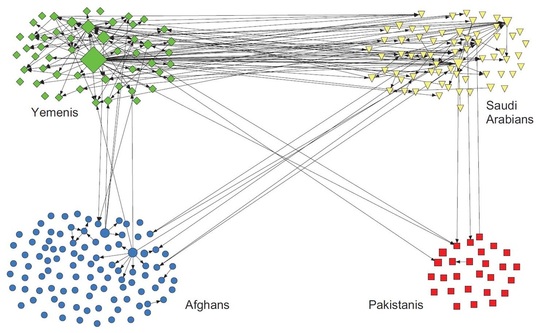Key words: Guantánamo, terrorism, social network analysis, power law, mosaic theory, learned helplessness, power-dependence, WikiLeaks
|
A new article, "Between Collaboration and Disobedience: The Behavior of the Guantánamo Detainees and Its Consequences", is now available online ahead-of-print in the Journal of Conflict Resolution. Based on a novel dataset created from Joint Task Force Guantanamo–authored memoranda on 765 detainees which had been purloined by Bradley Manning and published by WikiLeaks in April 2011, this study examines the behavior of the Guantánamo detainees in terms of collaboration and disobedience and how it influences their chances of getting a release recommendation. The centerpiece of the analysis is a network of incriminations between detainees. The figure below, which is taken from the article, shows a graphical representation of these accusations for a sample of detainees from the four largest national groups at Guantánamo (Yemenis, Saudi Arabians, Afghans, and Pakistanis). It indicates that Yemenis and Saudi Arabians heavily overcontribute regarding incriminating statements, whereas Afghans and Pakistanis undercontribute. In addition, the article reports that while a few detainees incriminate many others and many detainees incriminate only few others (the distribution of incriminating statements obeys a power law), the majority (62.6 percent) of all detainees do not incriminate anyone. Disobedient behavior does not affect the likelihood of getting a release recommendation, except for hunger striking, which has a negative effect. By releasing information, detainees don’t improve their own chances of getting release recommendations but impair those of the detainees they implicate. In the discussion at the end of the article, three different groups of detainees are identified (high-level-, low-level, and non-collaborators) whose behavioral patterns seem to follow distinct logics.
Key words: Guantánamo, terrorism, social network analysis, power law, mosaic theory, learned helplessness, power-dependence, WikiLeaks A new article, "Measuring the Europeanization of Everyday Life: Three New Indices and an Empirical Application", co-authored by Jan Delhey, Timo Graf, Katharina Richter and myself is now available in European Societies. Abstract: This article seeks to conceptually clarify the measurement of Europeanization from a transactional perspective. Following Karl Deutsch, we regard cross-border practices and sense of community as constitutive for an emerging European society. But we critically reassess how this approach has been put into empirical practice by contemporary scholars. Typically, too much attention is paid to absolute Europeanization, and too little to relative Europeanization. In order to properly investigate the European society as situated between the nation-state and the world society, we argue that Europeanization involves both national openness (the salience of Europe compared to the nation-state) and external closure (the salience of Europe compared to the world). Three indices are suggested to capture relative Europeanization and its major components. Recent Eurobarometer and European Values Study data on practices and attitudes of EU citizens is used to illustrate our approach empirically. The results demonstrate that external closure adds a new layer of information for understanding everyday life Europeanization. We also find a bifurcation between practices for which Europe is the more relevant reference frame (as compared to the world) and attitudes for which it is not. Key words: European society, Europeanization, globalization, transnationalism, transactions, European identity Delhey, J. Deutschmann, E., Graf, T. & Richter, K. (2014). "Measuring the Europeanization of Everyday Life: Three New Indices and an Empirical Application", European Societies, 16(3): 355-377.
Finally I managed to create this research website, a project that had been in the pipeline for a long time. Inspired by Michele Coscia, whose fascinating posts I highly recommend following, I am simultaneously starting this blog. Time will tell whether it will actually evolve into a fully-fledged research blog with regular original posts, or whether it will merely consist of short notes about new publications, collaborations, and the like. Please have a look around! Any comments and suggestions are very much appreciated.
|
Categories
All
Archives
November 2023
|

 RSS Feed
RSS Feed